University Business Law Assignment: Legal Problems and Short Answers
VerifiedAdded on 2023/01/20
|8
|1798
|79
Homework Assignment
AI Summary
This document presents a comprehensive solution to a business law assignment, addressing various legal problems and short answer questions. The assignment covers key areas of business law, including contract law, intention to create legal relations, and the application of relevant case law such as Ermogenous v Greek Orthodox Community. The solution explores topics like the objective test for determining intention, the enforceability of agreements, and the impact of exclusion clauses. It also delves into the principles of consideration, promissory estoppel, and the liability of parties in different scenarios. The assignment analyzes specific cases, such as Ward v Byham and Hollier V Rambler Motors, to illustrate legal concepts and principles. Finally, it examines the application of The Goods Act 1958 (Vic), section 19, concerning the quality of goods and the seller's liability. Overall, the document provides a detailed analysis of the legal issues and offers well-reasoned solutions, making it a valuable resource for students studying business law.
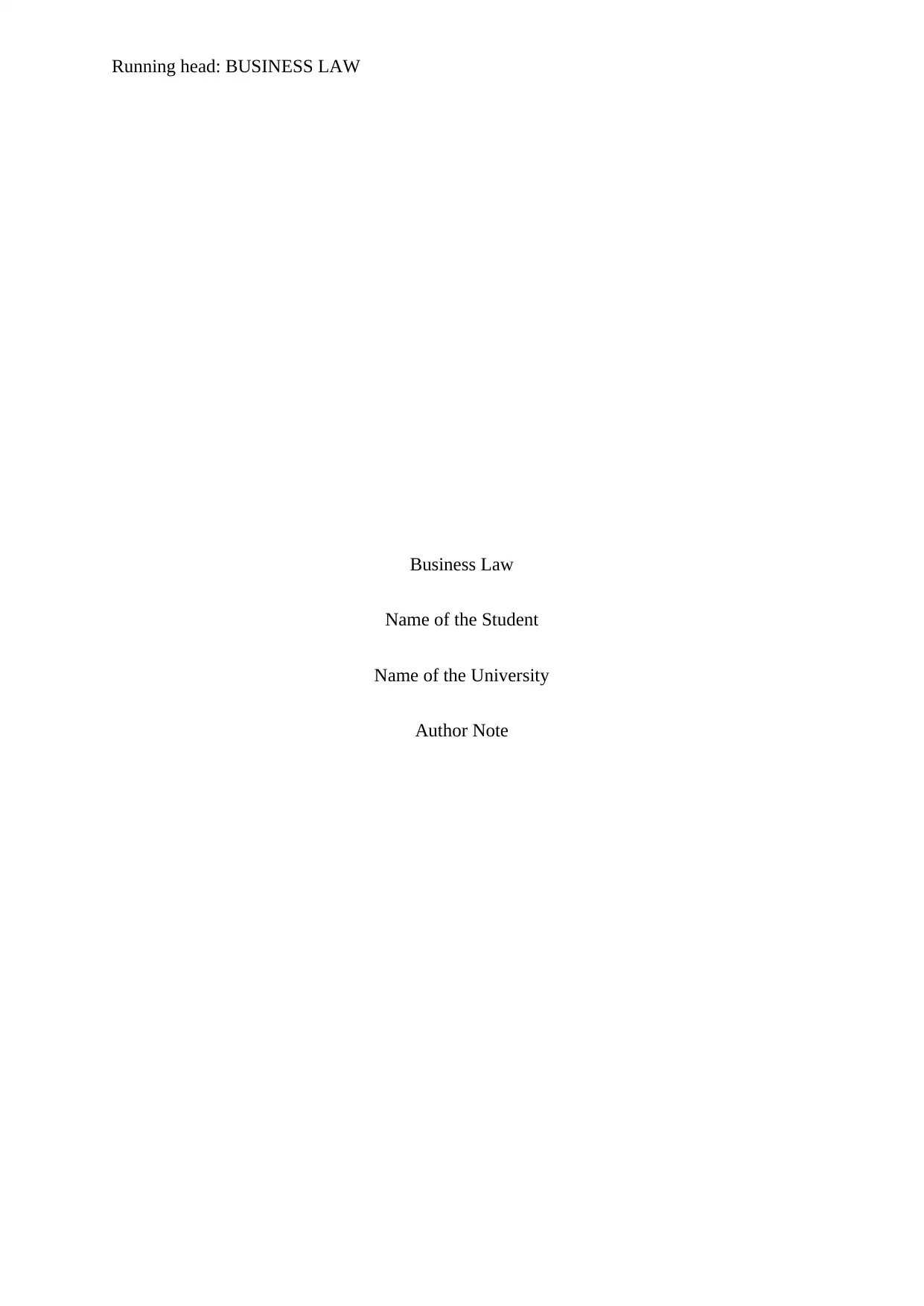
Running head: BUSINESS LAW
Business Law
Name of the Student
Name of the University
Author Note
Business Law
Name of the Student
Name of the University
Author Note
Paraphrase This Document
Need a fresh take? Get an instant paraphrase of this document with our AI Paraphraser
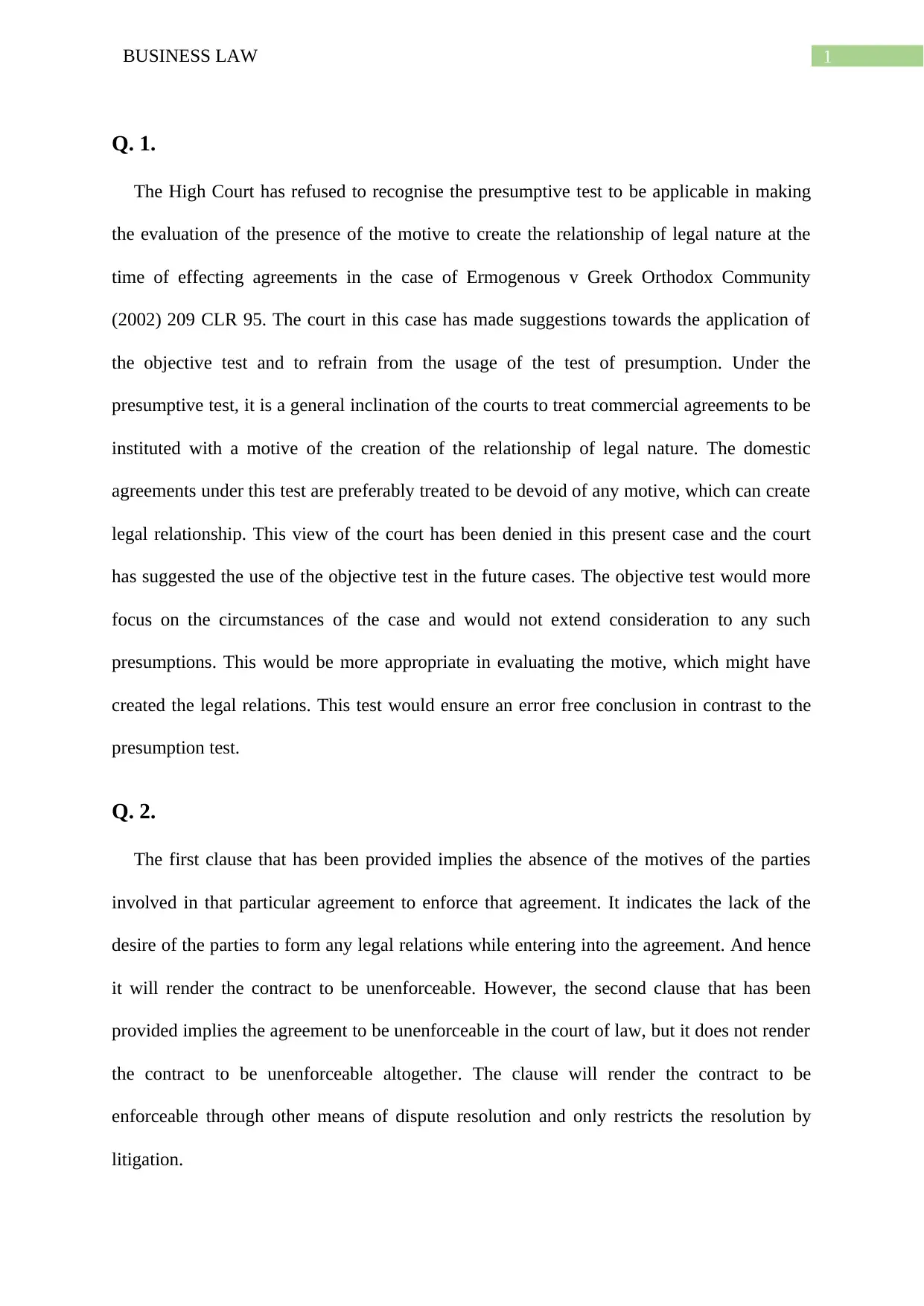
1BUSINESS LAW
Q. 1.
The High Court has refused to recognise the presumptive test to be applicable in making
the evaluation of the presence of the motive to create the relationship of legal nature at the
time of effecting agreements in the case of Ermogenous v Greek Orthodox Community
(2002) 209 CLR 95. The court in this case has made suggestions towards the application of
the objective test and to refrain from the usage of the test of presumption. Under the
presumptive test, it is a general inclination of the courts to treat commercial agreements to be
instituted with a motive of the creation of the relationship of legal nature. The domestic
agreements under this test are preferably treated to be devoid of any motive, which can create
legal relationship. This view of the court has been denied in this present case and the court
has suggested the use of the objective test in the future cases. The objective test would more
focus on the circumstances of the case and would not extend consideration to any such
presumptions. This would be more appropriate in evaluating the motive, which might have
created the legal relations. This test would ensure an error free conclusion in contrast to the
presumption test.
Q. 2.
The first clause that has been provided implies the absence of the motives of the parties
involved in that particular agreement to enforce that agreement. It indicates the lack of the
desire of the parties to form any legal relations while entering into the agreement. And hence
it will render the contract to be unenforceable. However, the second clause that has been
provided implies the agreement to be unenforceable in the court of law, but it does not render
the contract to be unenforceable altogether. The clause will render the contract to be
enforceable through other means of dispute resolution and only restricts the resolution by
litigation.
Q. 1.
The High Court has refused to recognise the presumptive test to be applicable in making
the evaluation of the presence of the motive to create the relationship of legal nature at the
time of effecting agreements in the case of Ermogenous v Greek Orthodox Community
(2002) 209 CLR 95. The court in this case has made suggestions towards the application of
the objective test and to refrain from the usage of the test of presumption. Under the
presumptive test, it is a general inclination of the courts to treat commercial agreements to be
instituted with a motive of the creation of the relationship of legal nature. The domestic
agreements under this test are preferably treated to be devoid of any motive, which can create
legal relationship. This view of the court has been denied in this present case and the court
has suggested the use of the objective test in the future cases. The objective test would more
focus on the circumstances of the case and would not extend consideration to any such
presumptions. This would be more appropriate in evaluating the motive, which might have
created the legal relations. This test would ensure an error free conclusion in contrast to the
presumption test.
Q. 2.
The first clause that has been provided implies the absence of the motives of the parties
involved in that particular agreement to enforce that agreement. It indicates the lack of the
desire of the parties to form any legal relations while entering into the agreement. And hence
it will render the contract to be unenforceable. However, the second clause that has been
provided implies the agreement to be unenforceable in the court of law, but it does not render
the contract to be unenforceable altogether. The clause will render the contract to be
enforceable through other means of dispute resolution and only restricts the resolution by
litigation.
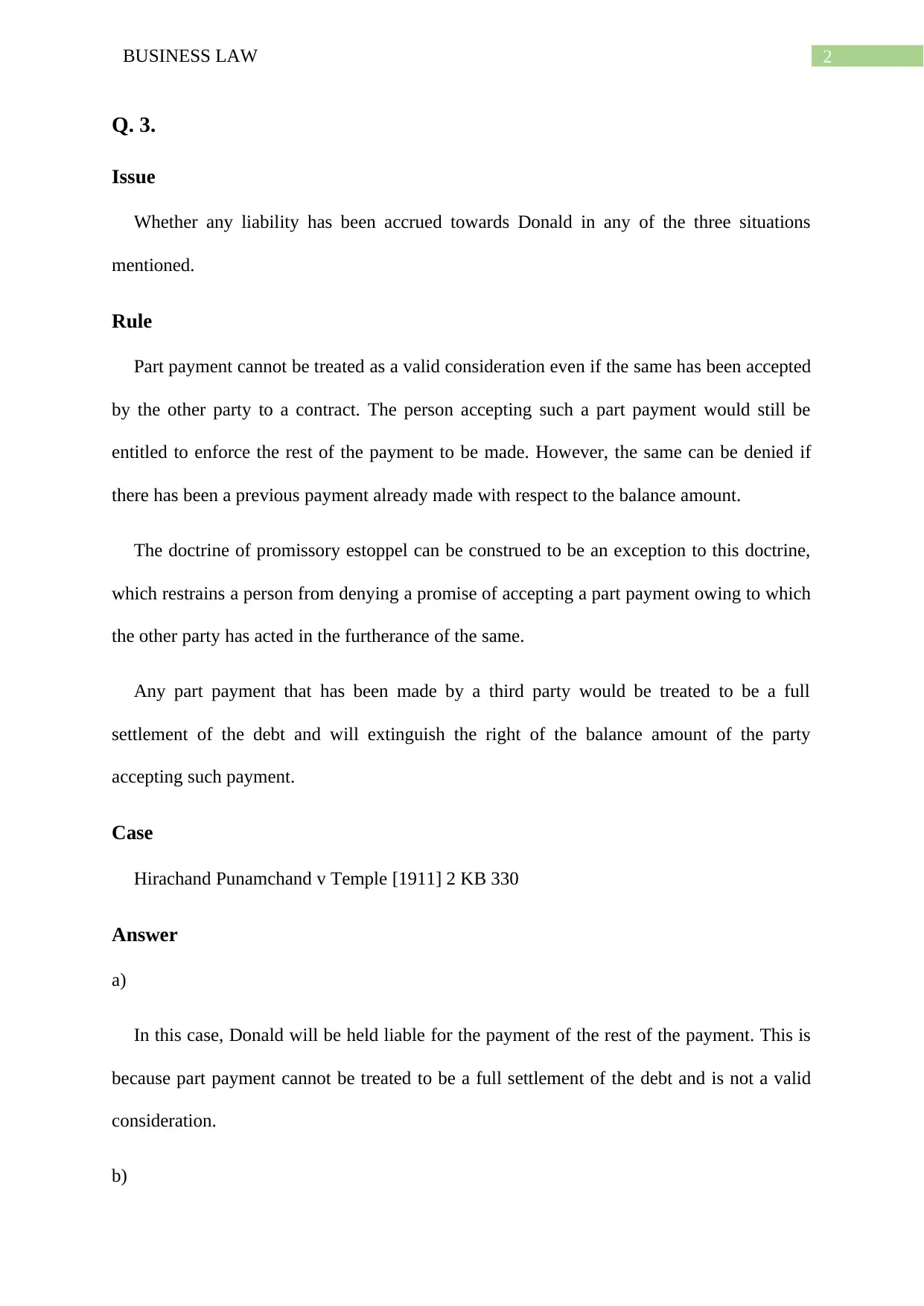
2BUSINESS LAW
Q. 3.
Issue
Whether any liability has been accrued towards Donald in any of the three situations
mentioned.
Rule
Part payment cannot be treated as a valid consideration even if the same has been accepted
by the other party to a contract. The person accepting such a part payment would still be
entitled to enforce the rest of the payment to be made. However, the same can be denied if
there has been a previous payment already made with respect to the balance amount.
The doctrine of promissory estoppel can be construed to be an exception to this doctrine,
which restrains a person from denying a promise of accepting a part payment owing to which
the other party has acted in the furtherance of the same.
Any part payment that has been made by a third party would be treated to be a full
settlement of the debt and will extinguish the right of the balance amount of the party
accepting such payment.
Case
Hirachand Punamchand v Temple [1911] 2 KB 330
Answer
a)
In this case, Donald will be held liable for the payment of the rest of the payment. This is
because part payment cannot be treated to be a full settlement of the debt and is not a valid
consideration.
b)
Q. 3.
Issue
Whether any liability has been accrued towards Donald in any of the three situations
mentioned.
Rule
Part payment cannot be treated as a valid consideration even if the same has been accepted
by the other party to a contract. The person accepting such a part payment would still be
entitled to enforce the rest of the payment to be made. However, the same can be denied if
there has been a previous payment already made with respect to the balance amount.
The doctrine of promissory estoppel can be construed to be an exception to this doctrine,
which restrains a person from denying a promise of accepting a part payment owing to which
the other party has acted in the furtherance of the same.
Any part payment that has been made by a third party would be treated to be a full
settlement of the debt and will extinguish the right of the balance amount of the party
accepting such payment.
Case
Hirachand Punamchand v Temple [1911] 2 KB 330
Answer
a)
In this case, Donald will be held liable for the payment of the rest of the payment. This is
because part payment cannot be treated to be a full settlement of the debt and is not a valid
consideration.
b)
⊘ This is a preview!⊘
Do you want full access?
Subscribe today to unlock all pages.

Trusted by 1+ million students worldwide
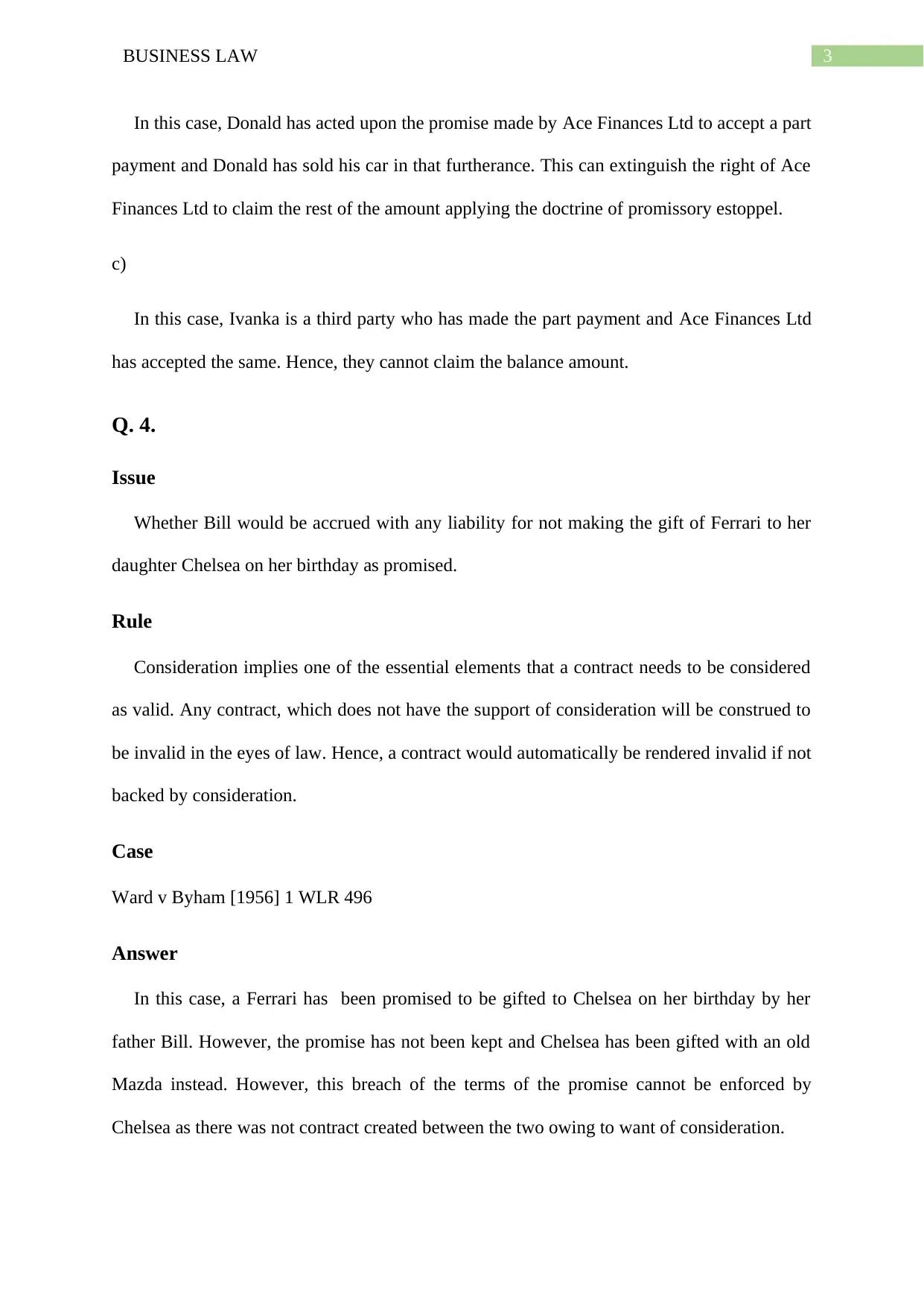
3BUSINESS LAW
In this case, Donald has acted upon the promise made by Ace Finances Ltd to accept a part
payment and Donald has sold his car in that furtherance. This can extinguish the right of Ace
Finances Ltd to claim the rest of the amount applying the doctrine of promissory estoppel.
c)
In this case, Ivanka is a third party who has made the part payment and Ace Finances Ltd
has accepted the same. Hence, they cannot claim the balance amount.
Q. 4.
Issue
Whether Bill would be accrued with any liability for not making the gift of Ferrari to her
daughter Chelsea on her birthday as promised.
Rule
Consideration implies one of the essential elements that a contract needs to be considered
as valid. Any contract, which does not have the support of consideration will be construed to
be invalid in the eyes of law. Hence, a contract would automatically be rendered invalid if not
backed by consideration.
Case
Ward v Byham [1956] 1 WLR 496
Answer
In this case, a Ferrari has been promised to be gifted to Chelsea on her birthday by her
father Bill. However, the promise has not been kept and Chelsea has been gifted with an old
Mazda instead. However, this breach of the terms of the promise cannot be enforced by
Chelsea as there was not contract created between the two owing to want of consideration.
In this case, Donald has acted upon the promise made by Ace Finances Ltd to accept a part
payment and Donald has sold his car in that furtherance. This can extinguish the right of Ace
Finances Ltd to claim the rest of the amount applying the doctrine of promissory estoppel.
c)
In this case, Ivanka is a third party who has made the part payment and Ace Finances Ltd
has accepted the same. Hence, they cannot claim the balance amount.
Q. 4.
Issue
Whether Bill would be accrued with any liability for not making the gift of Ferrari to her
daughter Chelsea on her birthday as promised.
Rule
Consideration implies one of the essential elements that a contract needs to be considered
as valid. Any contract, which does not have the support of consideration will be construed to
be invalid in the eyes of law. Hence, a contract would automatically be rendered invalid if not
backed by consideration.
Case
Ward v Byham [1956] 1 WLR 496
Answer
In this case, a Ferrari has been promised to be gifted to Chelsea on her birthday by her
father Bill. However, the promise has not been kept and Chelsea has been gifted with an old
Mazda instead. However, this breach of the terms of the promise cannot be enforced by
Chelsea as there was not contract created between the two owing to want of consideration.
Paraphrase This Document
Need a fresh take? Get an instant paraphrase of this document with our AI Paraphraser
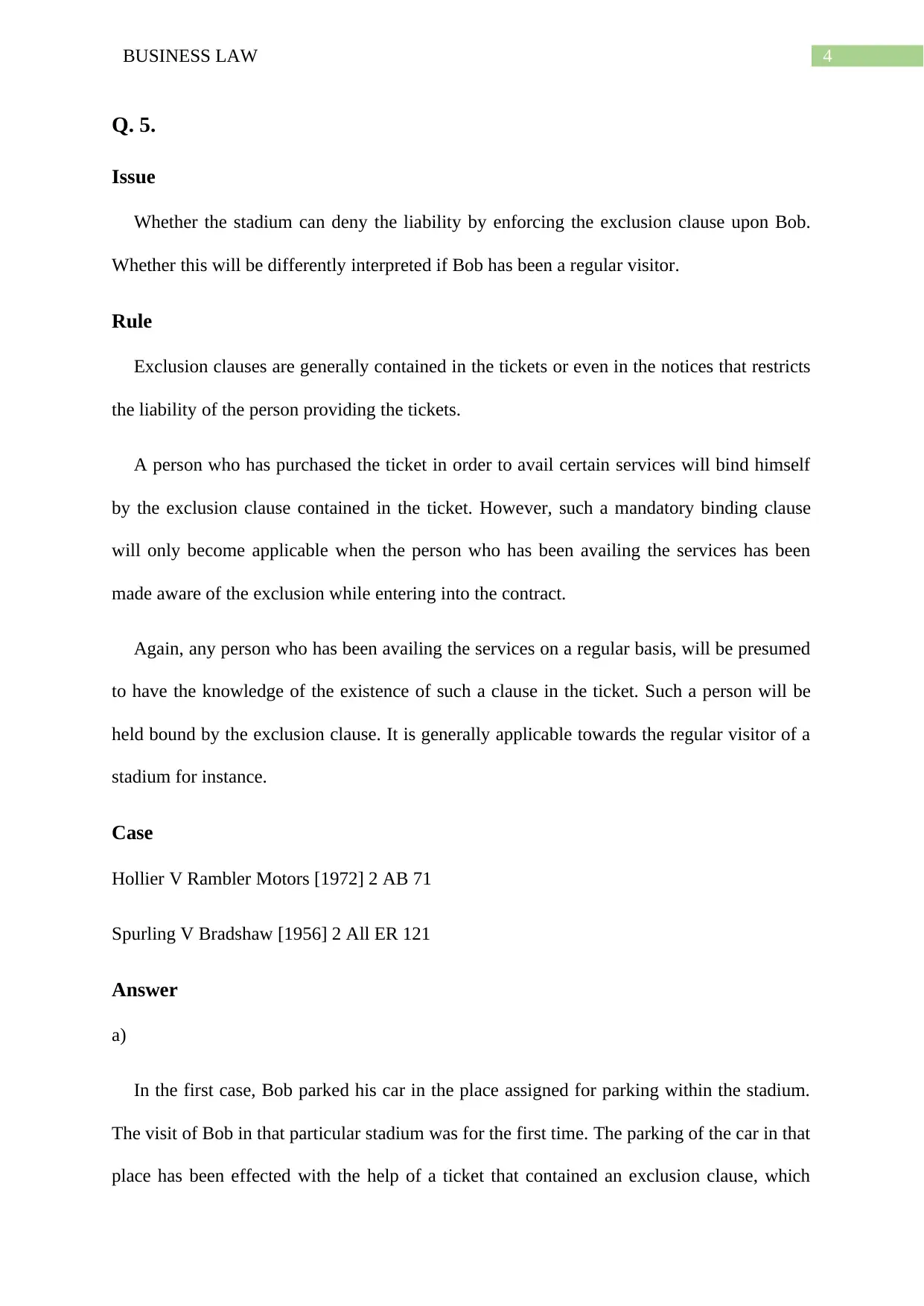
4BUSINESS LAW
Q. 5.
Issue
Whether the stadium can deny the liability by enforcing the exclusion clause upon Bob.
Whether this will be differently interpreted if Bob has been a regular visitor.
Rule
Exclusion clauses are generally contained in the tickets or even in the notices that restricts
the liability of the person providing the tickets.
A person who has purchased the ticket in order to avail certain services will bind himself
by the exclusion clause contained in the ticket. However, such a mandatory binding clause
will only become applicable when the person who has been availing the services has been
made aware of the exclusion while entering into the contract.
Again, any person who has been availing the services on a regular basis, will be presumed
to have the knowledge of the existence of such a clause in the ticket. Such a person will be
held bound by the exclusion clause. It is generally applicable towards the regular visitor of a
stadium for instance.
Case
Hollier V Rambler Motors [1972] 2 AB 71
Spurling V Bradshaw [1956] 2 All ER 121
Answer
a)
In the first case, Bob parked his car in the place assigned for parking within the stadium.
The visit of Bob in that particular stadium was for the first time. The parking of the car in that
place has been effected with the help of a ticket that contained an exclusion clause, which
Q. 5.
Issue
Whether the stadium can deny the liability by enforcing the exclusion clause upon Bob.
Whether this will be differently interpreted if Bob has been a regular visitor.
Rule
Exclusion clauses are generally contained in the tickets or even in the notices that restricts
the liability of the person providing the tickets.
A person who has purchased the ticket in order to avail certain services will bind himself
by the exclusion clause contained in the ticket. However, such a mandatory binding clause
will only become applicable when the person who has been availing the services has been
made aware of the exclusion while entering into the contract.
Again, any person who has been availing the services on a regular basis, will be presumed
to have the knowledge of the existence of such a clause in the ticket. Such a person will be
held bound by the exclusion clause. It is generally applicable towards the regular visitor of a
stadium for instance.
Case
Hollier V Rambler Motors [1972] 2 AB 71
Spurling V Bradshaw [1956] 2 All ER 121
Answer
a)
In the first case, Bob parked his car in the place assigned for parking within the stadium.
The visit of Bob in that particular stadium was for the first time. The parking of the car in that
place has been effected with the help of a ticket that contained an exclusion clause, which
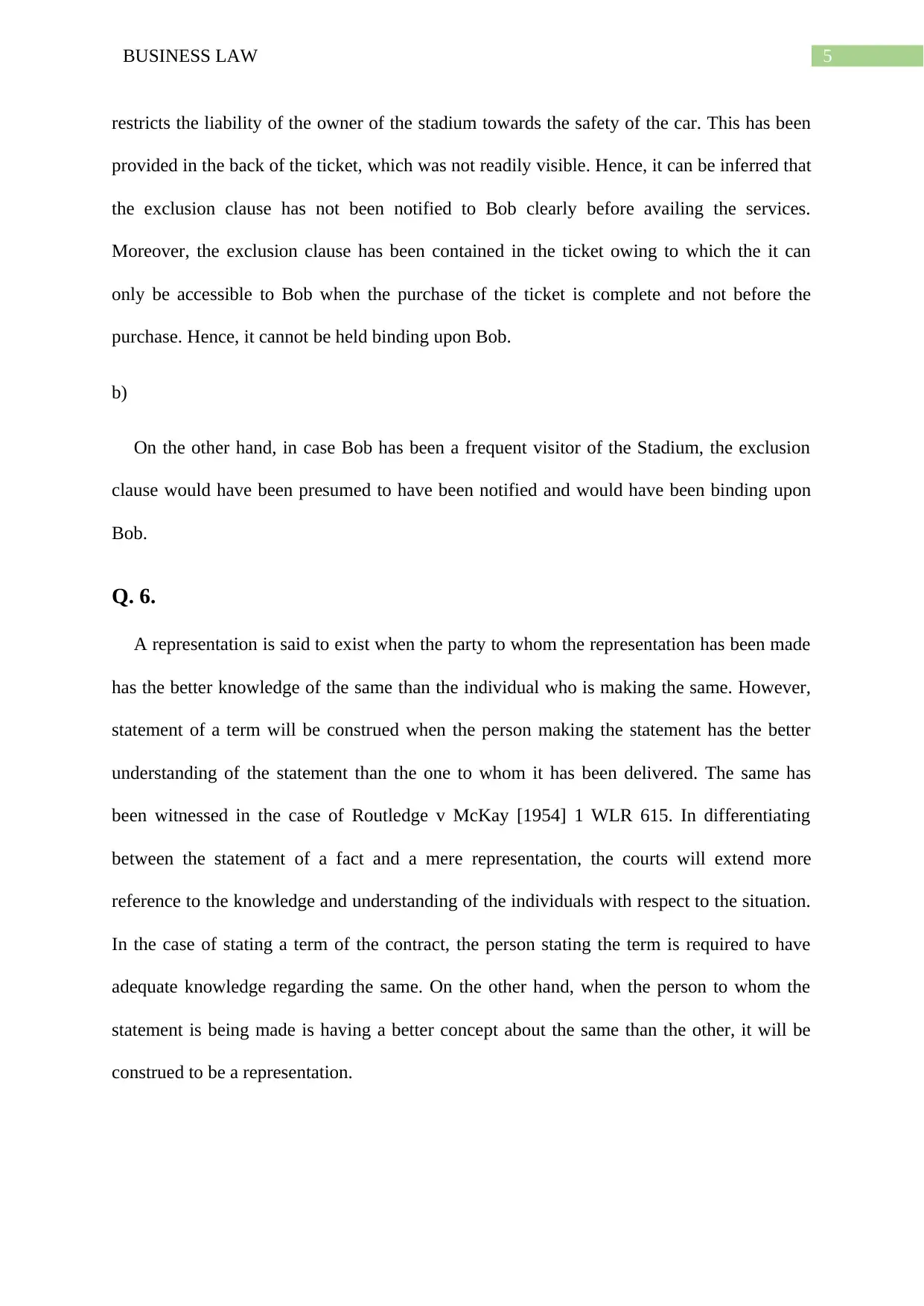
5BUSINESS LAW
restricts the liability of the owner of the stadium towards the safety of the car. This has been
provided in the back of the ticket, which was not readily visible. Hence, it can be inferred that
the exclusion clause has not been notified to Bob clearly before availing the services.
Moreover, the exclusion clause has been contained in the ticket owing to which the it can
only be accessible to Bob when the purchase of the ticket is complete and not before the
purchase. Hence, it cannot be held binding upon Bob.
b)
On the other hand, in case Bob has been a frequent visitor of the Stadium, the exclusion
clause would have been presumed to have been notified and would have been binding upon
Bob.
Q. 6.
A representation is said to exist when the party to whom the representation has been made
has the better knowledge of the same than the individual who is making the same. However,
statement of a term will be construed when the person making the statement has the better
understanding of the statement than the one to whom it has been delivered. The same has
been witnessed in the case of Routledge v McKay [1954] 1 WLR 615. In differentiating
between the statement of a fact and a mere representation, the courts will extend more
reference to the knowledge and understanding of the individuals with respect to the situation.
In the case of stating a term of the contract, the person stating the term is required to have
adequate knowledge regarding the same. On the other hand, when the person to whom the
statement is being made is having a better concept about the same than the other, it will be
construed to be a representation.
restricts the liability of the owner of the stadium towards the safety of the car. This has been
provided in the back of the ticket, which was not readily visible. Hence, it can be inferred that
the exclusion clause has not been notified to Bob clearly before availing the services.
Moreover, the exclusion clause has been contained in the ticket owing to which the it can
only be accessible to Bob when the purchase of the ticket is complete and not before the
purchase. Hence, it cannot be held binding upon Bob.
b)
On the other hand, in case Bob has been a frequent visitor of the Stadium, the exclusion
clause would have been presumed to have been notified and would have been binding upon
Bob.
Q. 6.
A representation is said to exist when the party to whom the representation has been made
has the better knowledge of the same than the individual who is making the same. However,
statement of a term will be construed when the person making the statement has the better
understanding of the statement than the one to whom it has been delivered. The same has
been witnessed in the case of Routledge v McKay [1954] 1 WLR 615. In differentiating
between the statement of a fact and a mere representation, the courts will extend more
reference to the knowledge and understanding of the individuals with respect to the situation.
In the case of stating a term of the contract, the person stating the term is required to have
adequate knowledge regarding the same. On the other hand, when the person to whom the
statement is being made is having a better concept about the same than the other, it will be
construed to be a representation.
⊘ This is a preview!⊘
Do you want full access?
Subscribe today to unlock all pages.

Trusted by 1+ million students worldwide
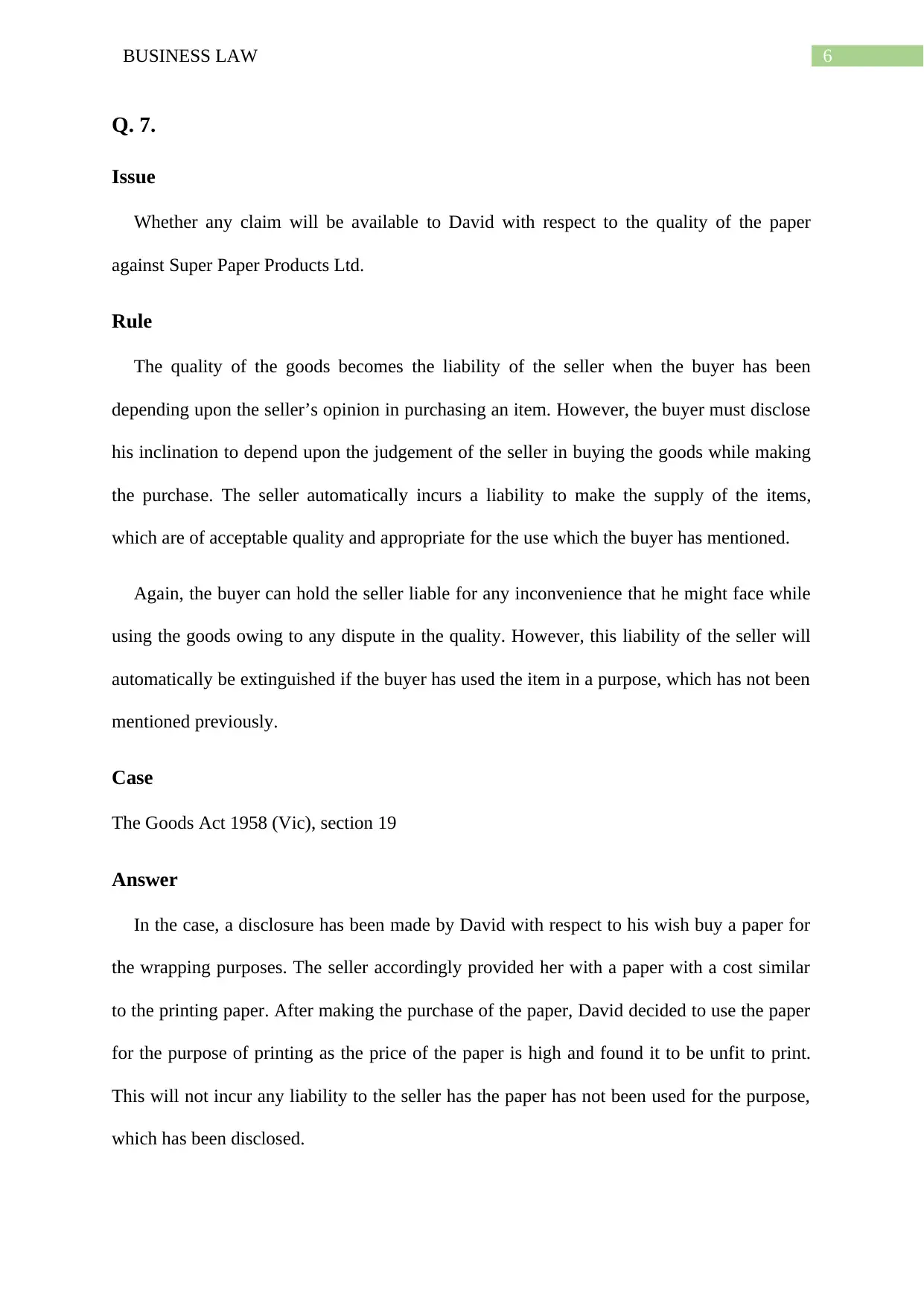
6BUSINESS LAW
Q. 7.
Issue
Whether any claim will be available to David with respect to the quality of the paper
against Super Paper Products Ltd.
Rule
The quality of the goods becomes the liability of the seller when the buyer has been
depending upon the seller’s opinion in purchasing an item. However, the buyer must disclose
his inclination to depend upon the judgement of the seller in buying the goods while making
the purchase. The seller automatically incurs a liability to make the supply of the items,
which are of acceptable quality and appropriate for the use which the buyer has mentioned.
Again, the buyer can hold the seller liable for any inconvenience that he might face while
using the goods owing to any dispute in the quality. However, this liability of the seller will
automatically be extinguished if the buyer has used the item in a purpose, which has not been
mentioned previously.
Case
The Goods Act 1958 (Vic), section 19
Answer
In the case, a disclosure has been made by David with respect to his wish buy a paper for
the wrapping purposes. The seller accordingly provided her with a paper with a cost similar
to the printing paper. After making the purchase of the paper, David decided to use the paper
for the purpose of printing as the price of the paper is high and found it to be unfit to print.
This will not incur any liability to the seller has the paper has not been used for the purpose,
which has been disclosed.
Q. 7.
Issue
Whether any claim will be available to David with respect to the quality of the paper
against Super Paper Products Ltd.
Rule
The quality of the goods becomes the liability of the seller when the buyer has been
depending upon the seller’s opinion in purchasing an item. However, the buyer must disclose
his inclination to depend upon the judgement of the seller in buying the goods while making
the purchase. The seller automatically incurs a liability to make the supply of the items,
which are of acceptable quality and appropriate for the use which the buyer has mentioned.
Again, the buyer can hold the seller liable for any inconvenience that he might face while
using the goods owing to any dispute in the quality. However, this liability of the seller will
automatically be extinguished if the buyer has used the item in a purpose, which has not been
mentioned previously.
Case
The Goods Act 1958 (Vic), section 19
Answer
In the case, a disclosure has been made by David with respect to his wish buy a paper for
the wrapping purposes. The seller accordingly provided her with a paper with a cost similar
to the printing paper. After making the purchase of the paper, David decided to use the paper
for the purpose of printing as the price of the paper is high and found it to be unfit to print.
This will not incur any liability to the seller has the paper has not been used for the purpose,
which has been disclosed.
Paraphrase This Document
Need a fresh take? Get an instant paraphrase of this document with our AI Paraphraser
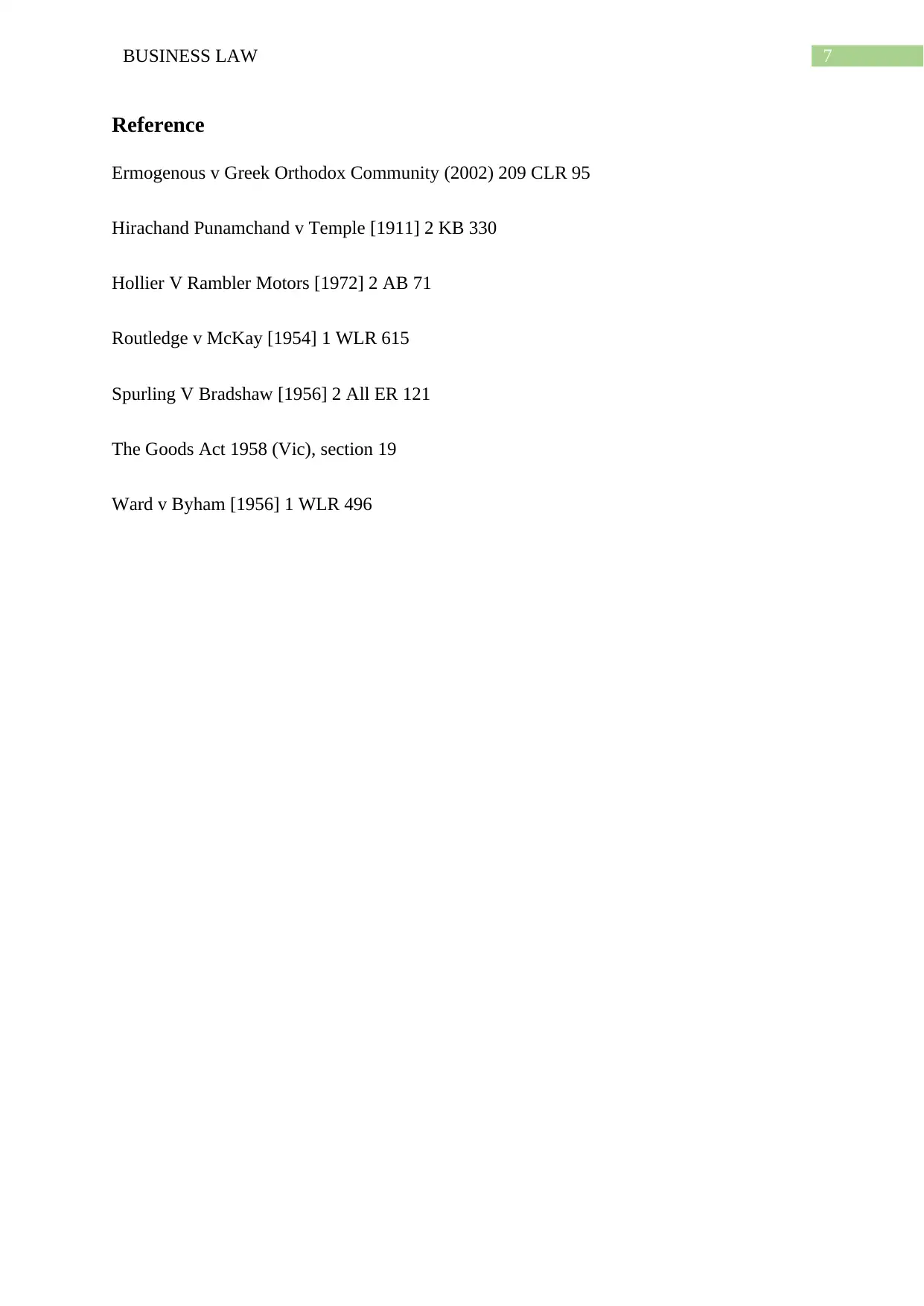
7BUSINESS LAW
Reference
Ermogenous v Greek Orthodox Community (2002) 209 CLR 95
Hirachand Punamchand v Temple [1911] 2 KB 330
Hollier V Rambler Motors [1972] 2 AB 71
Routledge v McKay [1954] 1 WLR 615
Spurling V Bradshaw [1956] 2 All ER 121
The Goods Act 1958 (Vic), section 19
Ward v Byham [1956] 1 WLR 496
Reference
Ermogenous v Greek Orthodox Community (2002) 209 CLR 95
Hirachand Punamchand v Temple [1911] 2 KB 330
Hollier V Rambler Motors [1972] 2 AB 71
Routledge v McKay [1954] 1 WLR 615
Spurling V Bradshaw [1956] 2 All ER 121
The Goods Act 1958 (Vic), section 19
Ward v Byham [1956] 1 WLR 496
1 out of 8
Related Documents
Your All-in-One AI-Powered Toolkit for Academic Success.
+13062052269
info@desklib.com
Available 24*7 on WhatsApp / Email
![[object Object]](/_next/static/media/star-bottom.7253800d.svg)
Unlock your academic potential
Copyright © 2020–2026 A2Z Services. All Rights Reserved. Developed and managed by ZUCOL.




